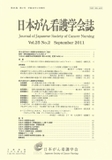Japanese
English
- 販売していません
- Abstract 文献概要
- 参考文献 Reference
要旨
本研究は,乳がんを体験した女性が治療過程で生じる心身苦痛体験を浮き彫りにし,その構造モデルを生成することを目的とする.治療を終えているまたは治療中の乳がん女性7名に半構造化面接法を実施し,質的帰納的分析を行った.治療過程で乳がん女性が体験していた苦痛体験として,初診時では《医療任意》の状況で診察が行われ,《命の意識化》をしながら《待つ間の苦悩》を体験していた.入院までは常に〈がん嫌悪〉を抱き,死を意識した生活を送りながら,《予後の想定》と《思うまま対処》を繰り返していた.また,入院から手術療法時までは,治療を決意しても《強葛藤》は続く.術後は《予想外の心身反応》が出現している一方で,〈無表現を解決とする不一致感〉と〈医療内の自己疎外〉を受けていた.追加治療説明時は治療への否定的な思いが《心身逆行》として現れた.そして,生活より治療が優先されることから《自己疎外》を感じながらも医療においては《弱者感》を抱いていた.追加治療では《不可抗力で妨げられる治療》の中,放射線療法では被曝に対する〈潜在的恐怖との闘い〉を体験しながら,〈継続維持の努力〉につとめていた.化学療法では《副反応との関連づけ》を行いながらも〈通常をふるまう生活〉を送るとともに〈左右する治療継続感〉で揺らいでいた.内分泌療法では〈ホルモン抑制でおこる身体異変徴候〉が出現する一方で,《治療への客観視》をし《闘病維持》をしていた.定期受診では,《心身消耗状態》のなかでも《身体責任感》のもと努力していた.しかし,闘病を〈支えになる体験者情報の提供〉によって保っているが,受診のたびに《病の意識》が強く蘇っていた.この構造から,乳がん体験者は治療時のみでなくその過程においてもなおさまざまな苦痛を体験していることが浮き彫りとなった.またそれが女性としての性役割にも強く影響を及ぼしていたことが明らかとなった.
Abstract
This study aimed to clarify physical and psychological suffering during the medical care process of females with breast cancer, and build a structural model. We conducted semi-structured interviews with 7 females during or after breast cancer treatment, and performed qualitative inductive analysis.
Concerning suffering experienced by the females during the medical care process, the first consultation was performed in a state of"focused therapy", and the females"became aware of their life", and experienced"pain caused by the waiting period for treatment". Until admission, they constantly "hated cancer", repeatedly"predicted the outcome"and"were controlled by emotions", and lived while being aware of death. From admission until surgery,"strong conflict"continued even after they decided to undergo treatment. After surgery, while developing"adverse physical and psychological reactions", they had"a feeling of inconsistency with no way to resolve this"and felt"selfalienation in medical care". Negative feelings toward additional treatment were expressed as"veiled emotion". Since treatment had priority over life, they had"a feeling of being weak"despite their "self-alienation". Concerning additional treatment, they sometimes"not have treatment due to uncontrollable matters"in their life. In radiotherapy, they"fought against a latent fear"of X-ray exposure, but made"efforts toward continuation and maintenance". In chemotherapy, while they experienced"related side effects", they"behaved normally in daily life"but were"affected by the necessity of continuing treatment". In endocrine therapy, while"physical symptoms develop as a result of abnormal hormone suppression", women"maintained their fight against the disease"with "an objective view of treatment". In regular examinations, they made efforts while"feeling responsible for their body"despite"physical and psychological exhaustion". Their fight against the disease was maintained by"receiving supportive information from females with the same experience", but "awareness of the disease"markedly increased during every examination.
This suggests that breast cancer patients are strongly affected by treatment not only during treatment, but also the entire medical care process, which markedly affects their gender roles.
Copyright © 2011, Japanese Society of Cancer Nursing All rights reserved.


